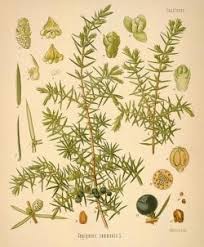Of the 60 or so species that comprise the juniper family, it's the berries of the common juniper (Juniperus communis) that are used as a medicine, spice and source of essential oil. The plant is a coniferous, evergreen shrub, or small tree, growing up to 6m, with reddish twigs and blueish-green, needle-like leaves.

Native to northern Europe, south-west Asia and North America, it grows at the edges of woodland, on heath, moorland and mountain slopes. The greenish-yellow 'flowers' (tiny cones) appear in early summer and develop into small 'berries' that take two to three years to ripen from green to blue and then to black. The whole plant emits a strong balsamic, pine-like aroma.
Juniper is an important medicinal plant that has been employed for thousands of years. Remains of the berries have been sound in prehistoric dwelling sites in the Swiss lakes. The ancient Greeks burned juniper as a fumigant to combat epidemics (including the plague) and the Tibetans and native Americans revered it as a sacred incense.
In the Middle Ages, juniper was believed to ward off demons, disease and venomous creatures and it was commonly placed next to cottage doors as a protection against 'the evil eye' and to keep snakes away. During the 19th century, the berries were burned in French hospitals to prevent the spread of smallpox. And in Switzerland juniper branches were smouldered over the fuel in schoolrooms to fumigate them when it was too cold to open windows.

In the 17th century, a Dutch physician Dr Sylvius, made a 'blood-purifying' concoction of twice-distilled, grain alcohol and juniper berries and called it 'jenever'. This Dutch gin was popular with English soldiers occupying Holland at the time, and they brought the recipe back home, where - in English gin - the perfumed juniper flavour became even more pronounced.
Juniper is also used to flavour other liqueurs and soft drinks. In the kitchen, the crushed, ripe berries impart a piquant flavour to roasts, casseroles and especially baked or stuffed red cabbage. The berries are particularly suitable for recipes using game.
Modern Research
Scientific analysis of juniper berries reveals that they contain powerful medicinal substances, including organic acids, tannins and a bitter compound known as juniperin. These give juniper strong diuretic, tonic, carminative (relieves flatulence and griping pain in the abdomen) and antiseptic properties. Herbalists use the crushed dried berries in teas for cystitis, diarrhoea, flatulence, gout and rheumatic pain. When chewed, the berries sweeten the breath and help to heal infected gums. And juniper compresses (using juniper tea) are beneficial for infected skin conditions. Both herbalists and aromatherapists recommend steam inhalations of the oil to ease bronchitis, colds and flu. Incidentally, the wood and needles have similar medicinal properties, although they are not as potent as the berries.
Nature of the Oil
The highest-quality oil is extracted by steam distillation of the berries. It's a virtually colourless liquid with a fresh, woody-balsamic, peppery aroma. Its odour effect is warming and restorative, yet also calming. Juniper is also reputed to be an aphrodisiac.
When buying the essential oil, however, do ensure that the bottle is labelled 'Juniper berry' and not just 'juniper'. The latter is likely to be an inferior oil distilled from either the fermented berries (a by-product of juniper brandy manufacture) or the needles and wood. Such oils have a turpentine-like aroma, totally devoid of the balsamic, peppery notes found in a good juniper oil.
Properties of the Oil
Aromatherapists value juniper berry oil for its detoxifying properties - its ability to promote the elimination of uric acid and other toxic wastes from the system. An accumulation of such wastes worsens gout, rheumatism and arthritis. When used in compresses, baths or massage blends, the oil is valuable for cellulite, fluid retention in PMS and cystitis. Some people find juniper can irritate the skin, so keep to a fairly weak solution to start with.
Juniper berry oil has excellent astringent properties and is used (often combined with cypress, frankincense or geranium) in the treatment of haemorrhoids, either in a sitz bath or as an ingredient in ointments. The oil is also valuable for skin problems such as excessively oily skin and acne. In France, the oil is highly regarded as a tonic, particularly beneficial in convalescence. For this purpose, it's usually diluted in carrier oil and used as a whole-body friction rub.
In view of juniper's ability to detox a congested system, coinciding with its ancient reputation as a shield against demonic influences, many aromatherapists credit the oil with the ability cleanse and disperse on a psychological level too. It is said to help purge us of worry and despondency, and to dispel feelings of being 'invaded' by the emotional demands of others.